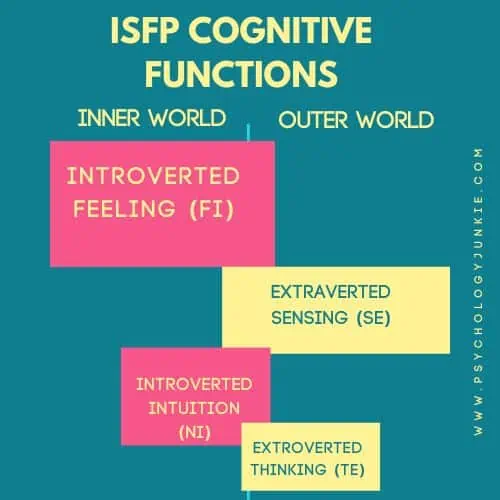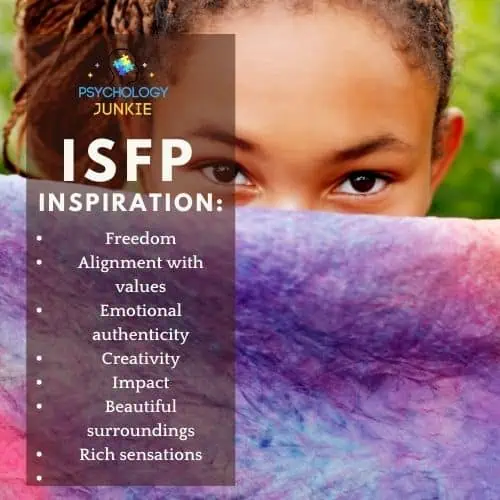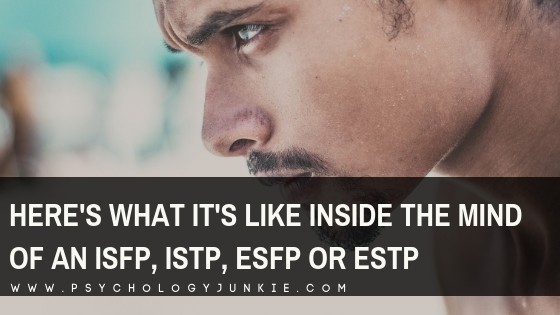The ISFP’s Cognitive Functions: A Guide
The ISFP personality type, often known as the “Virtuoso,” is a gem within the spectrum of Myers-Briggs® personality types. These individuals are characterized by their quiet, peaceful demeanor, a keen sense for aesthetics, and a deep-seated compassion for others. Yet, they possess an inner fire, a passion for adventure that brings a unique flavor to their everyday life. Like a river, they flow with a serene surface, but underneath, there’s a world of depth and a current strong with emotion, artistry, and curiosity.
Today we’re going to explore the ISFP’s cognitive functions. But before we begin, let’s take a look at what the code ISFP actually means.

Not sure what your personality type is? Take our personality questionnaire here. Or you can take the official MBTI® here.
What Does ISFP Stand For?
Introverted: The first letter ‘I’ stands for ‘Introverted’. Introverted individuals are inward focused. They gain the most energy by reflecting on thoughts, ideas, and inner values.
Sensing: The second letter ‘S’ stands for ‘Sensing’. Sensing individuals are practical, detail-oriented and focused on the present. They rely on their five senses for information rather than intuitive hunches. They focus more on facts than on theories or abstract concepts.
Feeling: ‘F’ stands for ‘Feeling’. Feeling individuals base their decisions on personal values and emotional impacts over impersonal logic.
Perceiving: The final letter ‘P’ stands for ‘Perceiving’. Perceiving individuals are flexible and spontaneous. They prefer to keep their options open rather than stick to a plan.
Understanding Cognitive Functions
Cognitive functions, at their core, represent the ways we take in and organize information and prioritize decisions. They are the mental tools that we use in life; some more consciously and frequently than others. In the context of the MBTI®, there are eight cognitive functions, each tied to a specific perspective or approach towards life. These functions are grouped into four pairs, with each pair consisting of an introverted and an extroverted variant. For the ISFP, these cognitive functions serve as the underlying current, guiding the river’s flow, lending depth and direction to their unique personalities.
Dominant, Auxiliary, Tertiary, and Inferior Functions
Each personality type in the Myers-Briggs system has a distinct hierarchy of cognitive functions, comprising a dominant, auxiliary, tertiary, and inferior function. This hierarchy is crucial in interpreting how ISFPs and other types perceive the world and respond to it.
Dominant Function: The dominant function is the most pronounced aspect of one’s personality. It’s the cognitive function that you naturally lean towards, the one that you’re most comfortable using. It’s like the captain steering the ship – the dominant force driving your thoughts and perceptions.
Auxiliary Function: The auxiliary function supports and balances the dominant function. While not as influential as the dominant function, it plays a key role in shaping your personality. Think of it as the first mate on a ship, assisting and complementing the captain. This function is one that we employ when we’re nurturing and helping others.
Tertiary Function: The tertiary function is less developed and often represents areas of growth throughout one’s life. This is akin to the crew on the ship, contributing to the overall journey but not as directly involved in steering the course. This function can have a childlike quality to it; it shows up when we’re playful, silly, and exploring without having to be too responsible.
Inferior Function: The inferior function is usually the least developed, but is also part of the “spine” of your personality. It still represents a core part of who you are; but when using it, one often feels vulnerable, uncertain, and less graceful than with the other three functions.
This hierarchy of functions, from dominant to inferior, provides a framework for understanding the complex dynamics of the ISFP personality type and indeed, all 16 personality types. It unveils the interplay of cognitive processes that shape our thoughts, behaviors, and interactions with the world.
Dominant Function: Introverted Feeling (Fi)
Introverted Feeling focuses on what is deeply important to the self. The ISFP asks questions like:
“What really matters to me in life?”
“Am I being authentic to what I really believe and value?”
“What are my feelings really telling me?”
“Is this worth it?”
For the ISFP, living in harmony with deeply-held core values is of utmost importance. Equally crucial is respecting the core values of others, unless they inherently clash with one another. As an example, an ISFP science enthusiast who passionately advocates for renewable energy might really struggle if their closest friend supported traditional fossil fuel industries.
When ISFPs approach life, they continuously seek out what holds emotional significance for them. It’s not about money, possessions, or prestige; rather, they focus on intangible values—the ones that truly matter when life nears its end. They want to look back on their journey with contentment, knowing they stayed true to themselves and their purpose, living a life that was honest and meaningful.
Introverted Feeling allows ISFPs to deeply connect with their emotional responses. They store these responses within, organizing them through time and retrieving them when the situation calls for it. For instance, when consoling a friend who has lost a loved one, they instinctively tap into their emotional reservoir of “grief.” By re-experiencing their own grief, they are able to empathize profoundly with the other person. ISFPs engage in this process so effortlessly that it may seem as though they absorb the other person’s emotions when, in reality, they empathize by delving into their own emotions and identifying the closest match to what the other person is feeling. This process is so rapid that they can instantaneously “feel what others are feeling” in many situations.
Introverted Feeling gives ISFPs with a sense of certainty and purpose in their lives. They have “gut feelings” when something doesn’t sit right with them, and, when they are in a healthy state, they honor those feelings. Articulating these feelings verbally can be a challenge for them; the depth and intricacy of their emotions are not easily explained in rational terms. Nonetheless, they possess an inner compass that guides them, allowing them to sense what is right and when they are on a path that aligns with their heart.
Because ISFPs are acutely aware of this internal compass, they possess a remarkable ability to bring others closer to their core selves. They encourage authenticity, urging people to shed masks and facades, and to be honest about what truly matters to them on a profoundly human level. At their best, ISFPs demonstrate incredible tolerance and compassion towards individuals from all walks of life. The more they understand themselves— their emotions, motivations, and inner workings—the better they comprehend others.
Healthy Introverted Feeling Can Be:
Empathetic, Genuine, Tender, Self-Aware, Inquisitive about Others’ Values, Understanding, Profound, and Guided by Integrity.
Unhealthy Introverted Feeling Can Be:
Selfish, Judgemental of Others’ Values, Disillusioned with Reality, Self-Righteous, and Self-Absorbed.
Auxiliary Function: Extraverted Sensing (Se)
Extraverted Sensing, the auxiliary function for ISFPs, is all about living in the present moment. Se asks questions like:
“What’s happening around me right now?”
“How can I best interact with my environment?”
“What sensory experiences are available to me in this moment?”
ISFPs, through Extraverted Sensing, have a deep appreciation for the beauty and richness of the world around them. They are attuned to their surroundings and are often aware of even the slightest changes. This function enables them to react quickly, making them adept at handling real-time situations.
Se provides a direct pipeline to the physical world, enabling ISFPs to immerse themselves in their surroundings and engage in sensory experiences fully. Whether it’s appreciating the beauty of a sunset, savoring the flavors of a gourmet meal, or feeling the beat of music resonate in their bodies, ISFPs with well-developed Se are able to fully experience and enjoy the present moment.
Extraverted Sensing also helps ISFPs to be practical and pragmatic. They are good at recognizing what is necessary and feasible in a given situation, and this often makes them excellent problem solvers. This function also aids in their ability to adapt and be flexible, effortlessly adjusting to any changes in their environment.
While Introverted Feeling digs deep within, Extraverted Sensing encourages ISFPs to reach out to the world, formulating a perfect balance between inner values and outer experiences. ISFPs’ ability to combine deeply-held convictions with an appreciation for immediate sensory experiences results in a personality type that is compassionate, adaptable, and vibrant.
ISFPs also use Extraverted Sensing to assist others by fostering a strong connection with the present moment and their immediate surroundings. Their adeptness at noticing even the minutest details in their environment equips them to intuitively understand the needs of those around them. Whether it’s recognizing a subtle change in a friend’s behavior, spotting potential hazards during an outdoor activity, or ingeniously using available resources to solve a problem, ISFPs employ Extraverted Sensing as an essential tool to assist and protect others. This acute sensitivity to their environment, combined with their empathy and their ability to adapt quickly to real-time situations, makes ISFPs exceptionally supportive and insightful companions.
Healthy Extraverted Sensing Can Be:
Alive, Adaptable, Present, Practical, Sensually Aware, and Realistic.
Unhealthy Extraverted Sensing Can Be:
Impulsive, Overindulgent, Distracted, Surface-Level, and Materialistic.
Tertiary Function: Introverted Intuition (Ni)
Introverted Intuition (Ni), as a tertiary function in ISFPs, provides an intriguing depth to their perceptual abilities and creative expression. This function is about understanding patterns and connections, fostering a sense of foresight, and delving into abstract concepts. It contributes to the ISFP’s ability to explore the realm of possibilities beyond what is presently observable or tangible.
ISFPs utilize Ni in a playful, recreational context, providing a spark to their creativity. They enjoy speculating introspectively about the future, making abstract connections, and recognizing subtle patterns that may not be immediately obvious. Whether this means experimenting with different artistic styles, imaginatively interpreting a piece of music, or decoding the symbolism in a movie, the influence of Ni is evident in the innovative aspect of ISFPs’ pursuits.
This function also allows ISFPs to appreciate individuals who can engage them in abstract, creative, or future-oriented discussions. They occasionally enjoy conversations that encourage them to spot hidden meanings, that challenge them to think differently, and that stimulate their imagination. They appreciate people who can ‘tap into’ their Ni, understanding and encouraging this less serious, creative side of them. That said, ISFPs can lose patience if conversations in this realm go on for an excessively long time. They can start to feel exhausted and hungry for information that is real, tangible, and more in line with their Sensing preferences.
The tertiary position of Introverted Intuition (Ni) in the ISFP’s function stack contributes to occasional moments of instability and immaturity. While Ni can fuel the ISFP’s creativity and insight, when it’s not well-developed or balanced with their primary and auxiliary functions, it can lead to feelings of paranoia or anxiety. ISFPs may find themselves over-analyzing situations, second-guessing their perceptions, or feeling overwhelmed by inexplicable hunches about the future. They might struggle to interpret a surplus of abstract ideas and connections, which can sometimes unsettle their normally calm demeanor. When this happens, ISFPs should take some time to tap into their auxiliary function, Extraverted Sensing, and get more in touch with what grounds them.
ISFPs’ use of Ni, although not as deeply or consistently as their dominant and auxiliary functions, adds a layer of complexity and richness to their personality. It amplifies their artistry, enhances their understanding of the world, and allows them to spot patterns and symbolic meaning.
Healthy Introverted Intuition Can Be:
Visionary, Creative, Innovative, Deep, and Insightful.
Unhealthy Introverted Intuition Can Be:
Disconnected from Reality, Overly Abstract, Overly Idealistic, and Prone to Overthink.
Inferior Function: Extraverted Thinking (Te)
Extraverted Thinking (Te) takes the role of the inferior function for the ISFP personality type. This function is centered around organizing, structuring, and making efficient use of resources to achieve clear, objective outcomes. In the ISFP’s functional stack, its placement in the inferior position often seems paradoxical. It is a crucial component of the ISFP’s self, contributing to their ability to take effective action in their external world, yet it can also be the source of vulnerability and insecurity.
ISFPs are capable of employing Te in spurts, particularly when a situation calls for immediate, efficient decision-making or when they are driven by a powerful Fi conviction. It may emerge during moments of high stress or when they need to take charge to protect their values or their loved ones. In these scenarios, ISFPs can express a surprising level of assertiveness, decisiveness, and organizational skill, taking others by surprise.
However, Te is not the ISFP’s natural realm. When expected to consistently operate in a Te-oriented manner – such as following strict schedules, adhering to rigid structures, or making decisions purely based on impersonal, logical criteria – ISFPs may feel strained and uncomfortable. They may struggle with such demands, often leading to self-doubt and feelings of inadequacy due to their inability to meet these Te-driven expectations.
ISFPs may also experience difficulty expressing their thoughts logically, concisely, or objectively, especially under stress, which can lead to misunderstandings or misinterpretations. They might find themselves second-guessing their decisions or struggling to maintain an organized environment, which can be a source of anxiety and frustration.
Nevertheless, the development of their inferior Te function can offer valuable growth opportunities for ISFPs. As they mature, they can learn to integrate Te more healthily into their lives, aiding them in expressing their thoughts more logically, setting clear goals, maintaining organization, and asserting their boundaries. It is essential for ISFPs to remember that while Te may occasionally make them feel vulnerable, its proper development and use can significantly enhance their effectiveness, confidence, and overall quality of life.
Healthy Extraverted Thinking Can Be:
Efficient, Organized, Assertive, Decisive, and Goal-Oriented.
Unhealthy Extraverted Thinking Can Be:
Overly Critical, Controlling, Impersonal, Overly Rigid, and Ignorant of Emotional Considerations.
The ISFP’s Shadow Functions
As we delve deeper into the unique characteristics of the ISFP personality type, we now find ourselves on the precipice of their shadow functions—the less conscious aspects of their personality. These shadow functions, often overlooked yet pivotal in shaping an individual’s personality, offer a hidden dimension to the ISFP. They are the parts that the ISFP is less likely to recognize as “them”, largely because they operate in the background, subtly influencing thoughts, feelings, and behaviors. In the following sections, we’ll explore these shadow functions, unraveling the complexities and nuances that make an ISFP truly unique.
The Opposing Role: Extraverted Feeling (Fe)
The Opposing Role is typically viewed as a defense mechanism, one that emerges when the personality feels under significant stress or threat. For the ISFP, this role is fulfilled by Extraverted Feeling (Fe). As an opposing voice to the ISFP’s dominant function, Introverted Feeling (Fi), Fe can emerge in a variety of ways, often leading to internal conflict within the ISFP’s mind.
ISFPs are primarily led by their Fi, which promotes authenticity and values living truthfully to oneself. However, when faced with situations that demand conformity to societal norms or expectations, the ISFP’s opposing function, Fe, can come into play. Fe is largely concerned with harmony, consensus, and “playing well with others.” This direct contrast to Fi can lead ISFPs to perceive Fe as a force opposing their natural inclinations.
When Fe influences ISFPs, they may find themselves acting out of character, expressing emotions outwardly, seeking validation from others, or struggling to maintain harmony in their external environment—all behaviors that contradict their introverted, independent, and authenticity-centered Fi. Often they’re doing this as a way to oppose something or someone; for example, if they are feeling defensive of their values, they might display unhealthy Fe characteristics such as “people-pleasing” behaviors or using emotional manipulation to avoid conflict. Or the ISFP may appeal to group values as a way to oppose their stance on something; pulling their attention towards societal values as a way to prove their “rightness.”
ISFPs, with their dominant Introverted Feeling (Fi) and opposing role Extraverted Feeling (Fe), may project an oppositional attitude towards individuals who primarily operate using Fe, such as those with FJ personality types. FJ personalities, like ESFJs or INFJs, place a substantial focus on external harmony, consensus, and social values. This is far different from the ISFP’s Introverted Feeling, which focuses on individual values, inner harmony, and marching to the beat of your own drum.
ISFPs may perceive these Fe-dominant personalities as overly concerned with societal expectations, possibly hindering true self-expression or authenticity. This can lead to ISFPs presenting a defensive stance, fostering an atmosphere of opposition. They may resist conforming to the societal norms that FJ personalities uphold and may feel misunderstood or stifled in their presence.
Such differences can create a chasm of misunderstanding between ISFPs and Fe-dominant individuals, leading to friction or misconceptions. However, if both parties learn to appreciate their unique perspectives and approaches, they can find a mutual ground, fostering a deeper understanding and healthier interpersonal dynamics.
The Critical Parent: Introverted Sensing (Si)
The Critical Parent role in the ISFP personality is played by Introverted Sensing (Si). This role can contribute to a feeling of internal dissonance and unease within the ISFP. Si is grounded in past experiences, has a sense for what’s real based on lived experience, and trusts subjective impressions of how things have been. Extraverted Sensing, the ISFP’s auxiliary function, is focused on the present moment and reacting in real-time to what’s happening now.
When ISFPs are operating from the Critical Parent state, they might become excessively focused on past experiences, often revisiting them with a critical eye. They may dwell on their past mistakes, or obsess over minute details that they ordinarily would overlook. This can lead to a pessimistic perspective, where they are unable to see the bigger picture, feeling confined by previous failures or missteps. They may also use this memories as a way to criticize themselves, chastize their failures, or limit their freedom to try new things. With others, they may remark on past failures or experiences as a way to limit or criticize them. Of course, this isn’t the ISFP’s natural tendency and the critical parent may show up in weaker moments where the ISFP isn’t at their best.
ISFPs might wrongly perceive individuals who primarily operate using Introverted Sensing, such as those with SJ personality types (ISTJ, ISFJ, ESTJ, ESFJ), as overly critical or restrictive. Because ISFPs process Introverted Sensing in a self-critical way, they may see any expression of Introverted Sensing as inherently critical. Thus, for example, when an ISTJ is telling the ISFP a tried-and-true way to budget their money to achieve their financial goals, the ISFP might interpret this as a personal slight or cold-hearted criticism. Similarly, when ISFPs pull from their past experiences and subjective impressions, they may do so in a more critical way than is natural for them.
However, it’s important to remember that these differences in perception and approach are not inherently negative. Introverted Sensing’s focus on past experiences and details can provide valuable insights and stability, while the ISFP’s authenticity and spontaneity can bring fresh perspectives and adaptability. Recognizing these differences as complementary rather than conflicting can foster mutual understanding and appreciation, leading to more harmonious interactions between ISFPs and SJ types. And as ISFPs grow and develop they can also develop more healthy use of Introverted Sensing, at times recalling past experiences at just the right moment to improve the present.
The Trickster: Extraverted Intuition (Ne)
The Trickster role in the ISFP personality is served by Extraverted Intuition (Ne). This function operates as a defense mechanism, particularly to protect the ISFP’s tertiary function, Introverted Intuition (Ni), from perceived threats or dismissive attitudes. ISFPs rely on their Ni to form internal insights and intuit future outcomes, often based on a synthesis of sensory experiences. However, when the validity of these insights is called into question or dismissed, the ISFP’s trickster function, Ne, may activate.
Ne is inherently exploratory, seeking multiple possibilities and “what-ifs” in the external world. In a defensive mode, ISFPs might project a myriad of potential scenarios or outcomes, often to the point of creating confusion or uncertainty in the minds of others. This is generally an unconscious process for the ISFP, undertaken to protect their valuable Ni insights from external criticism or dismissal. Recognizing the operation of the trickster function can help ISFPs understand their responses to perceived threats and navigate these situations more effectively. It can also help them appreciate the value of Extraverted Intuition in exploring new possibilities and open up their perspective to outside ideas.
The Demon: Introverted Thinking (Ti)
The Demon role in the ISFP personality is embodied by Introverted Thinking (Ti). This function is the most unconscious and primitive in the ISFP’s cognitive stack and tends to surface in times of extreme stress or unresolved trauma. Introverted Thinking is primarily concerned with logical consistency, objective analysis, and the pursuit of truth, which is far different from the ISFP’s dominant function of Introverted Feeling (Fi) that bases decisions on personal values and emotional resonance.
When under significant stress or emotional upheaval, ISFPs may resort to their Ti function. This can result in behaviors that are uncharacteristic of their usual self, such as becoming overly analytical, detached, or even cold in their interactions. They might scrutinize their decisions with an impersonal eye, trying to rationalize their feelings or fit their values into a logical framework. This process can be unsettling for the ISFP, adding further to their distress as it contradicts their natural decision-making process based on personal values and emotional considerations.
ISFPs may also experience difficulty in dealing with individuals who primarily use Ti, such as INTP and ISTP personality types. They may perceive these individuals as detached or dispassionate, potentially leading to misunderstandings or conflict. However, recognizing that these differences stem from different cognitive functions can help in mutual understanding and respect, facilitating more harmonious interactions.
However, when understood and handled effectively, the ISFP’s demon function can also serve as a source of personal growth and transformation. Engaging with their Ti can help ISFPs develop a more balanced perspective, integrating logical analysis with their value-based decision-making. It can be a powerful tool for self-improvement and personal development if the ISFP learns to navigate this often challenging aspect of their personality.
What Are Your Thoughts?
Do you relate to the ISFP personality type? How do you tap into your different cognitive functions? Can you see example of these functions in your everyday life? Let us know in the comments!
Find out more about your personality type in our eBooks, Discovering You: Unlocking the Power of Personality Type, The INFJ – Understanding the Mystic, The INTJ – Understanding the Strategist, and The INFP – Understanding the Dreamer. You can also connect with me via Facebook, Instagram, or Twitter!
Other Articles You Might Enjoy:
24 Signs That You’re an ISFP, the Virtuoso Personality Type
10 Things You Should Never Say to an ISFP
References:
The 16 Personality Types: Descriptions for Self-Discovery by Linda V. Berens and Dario Nardi (1999, InterStrength)
Depth Typology: The Guide Map to Becoming Who We Are by Mark Hunziker (2016, Write Way Publishing)
Building Blocks of Personality Type by Leona Haas and Mark Hunziker (Eltanin Publishing July 7, 2014)












